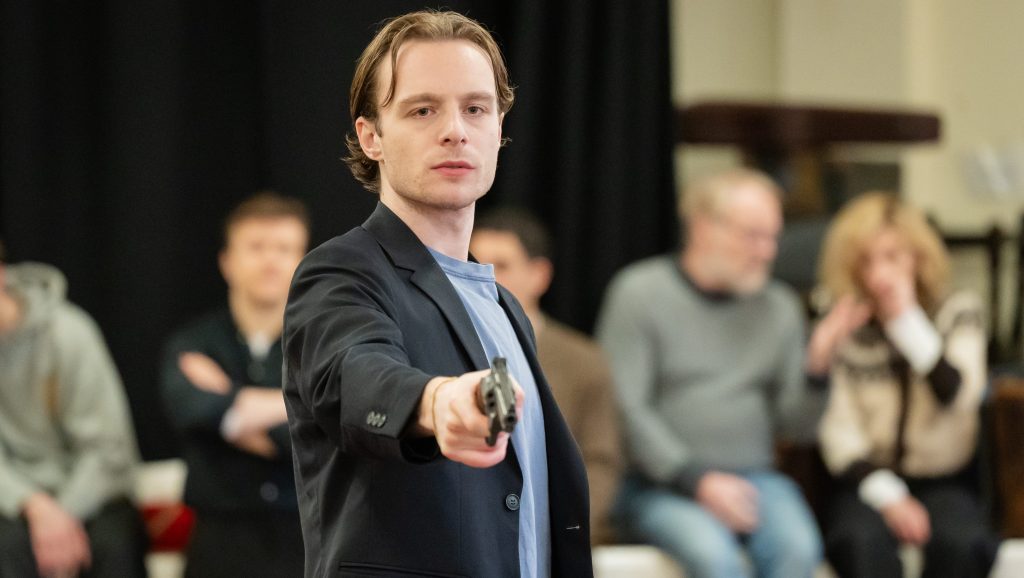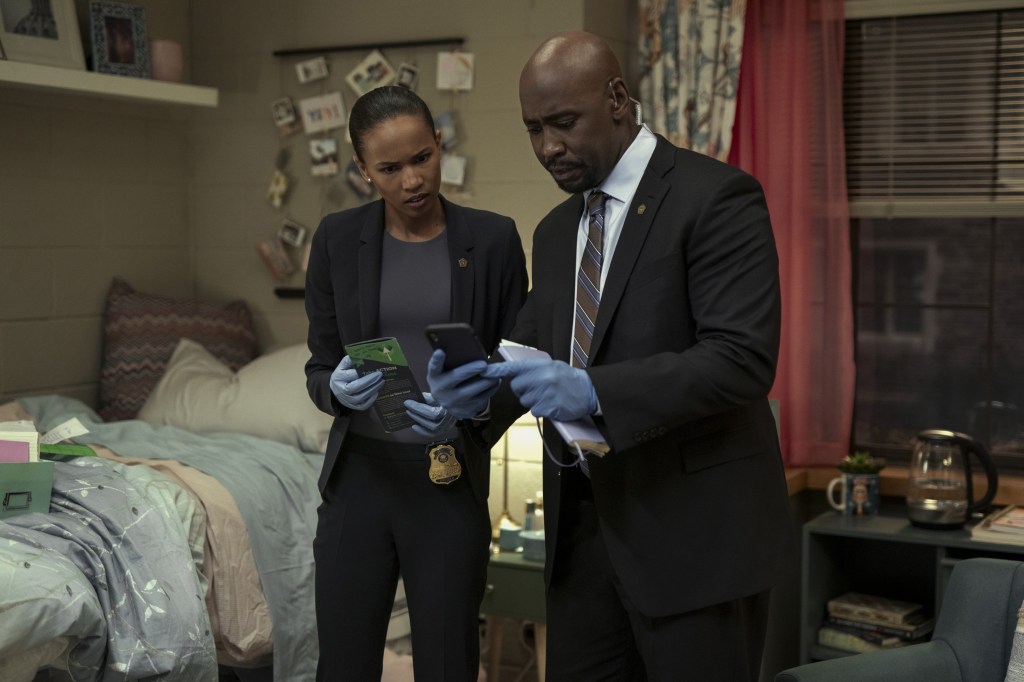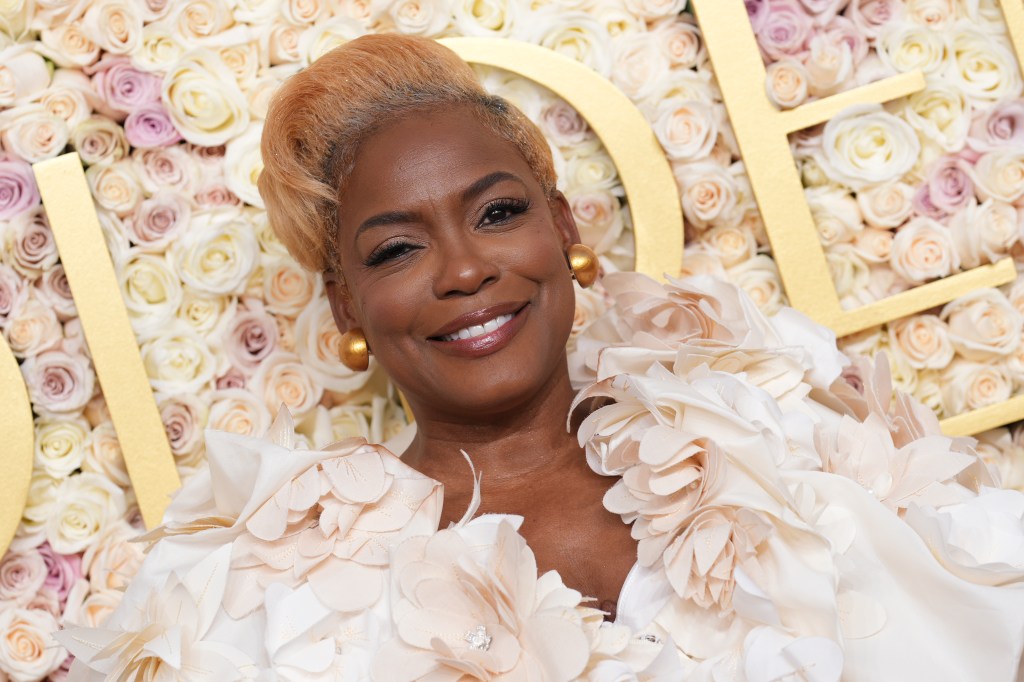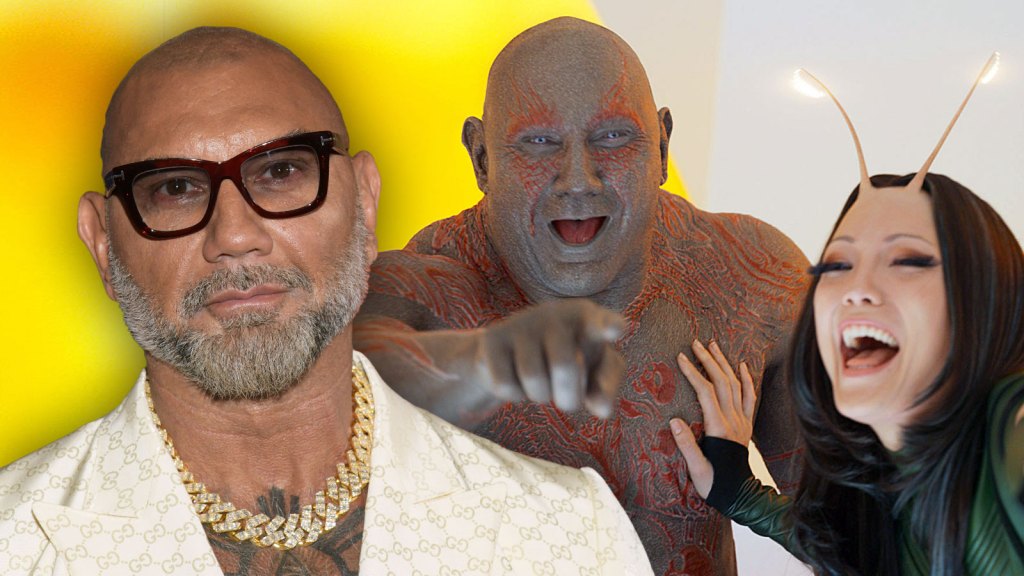EXCLUSIVE: Luke Thallon is in good company when it comes to playing Hamlet for the Royal Shakespeare Company.
Mark Rylance, Kenneth Branagh, Toby Stephens, Alex Jennings, David Tennant, and Paapa Essiedu are just a few of the actors who have taken on the melancholy royal for the RSC.
Ben Kingsley gave his Hamlet at Stratford-upon-Avon Upon Avon in 1975. When Richard Attenborough couldn’t decide who to cast to portray Mahatma Gandhi in his epic movie Gandhi, he remembered Kingsley’s interpretation of the Dane. The rest is Academy Award history.
Ben Kingsley in 1975 Royal Shakespeare Company production of ‘Hamlet’. Jay Cocks Studio Collection/Shakespeare Birthplace Trust.
Now it’s Thallon’s turn.
He’s unknown outside of the theatre world. But within it, he’s celebrated and adored, because he can, seemingly effortlessly, take on any role from a young grabby and grubby Roman Abramovich in Peter Morgan’s play Patriots, disparate roles in Tom Stoppard’s sprawling masterpiece Leopoldstadt, all the way back to his professional debut in Mike Bartlett’s 2017 production of Albion at the Almeida, which he did during his final year at the Guildhall School of Music & Drama.
That was directed by Rupert Goold (Judy) and they’ve become frequent collaborators ever since – Patriots and Cold War – and now they’re reunited for Hamlet which opened Tuesday night at the Royal Shakespeare Theatre on the banks of the River Avon.

Luke Thallon in the RSC’s ‘Hamlet.’ Marc Brenner/RSC
The principal cast consists of: Jared Harris as Claudius, Nancy Carroll as Gertrude, Anton Lesser, as the Ghost/First Player, Elliot Levey playing Polonius, Kel Matsena as Horatio, Lewis Shepherd as Laertes, and Nia Towle as Ophelia.
Over the years, actors have confided that preparing to play Hamlet is like training for the Olympics. “I think it’s, it’s certainly athletic,” Thallon responds.

Jared Harris at rehearsals for ‘Hamlet’. Ikin Yum/RSC
He adds, ”I’m not an athlete, but I imagine it’s akin to what athletes are doing before a big race. You are aware of just how much work there is to do, and you are aware of the people who’ve come before. If you want to honor the part and honor the tradition of previous actors and the quality of their work, you feel a great pressure and a great obligation to spend as much time as you can.”
He notes that he turned down work three months ahead of rehearsal to prepare.
“It’s kind of uncomfortable. The hard thing about this play, and I think it is crazy compared to any other plays, is the more you stare into it, the more it stares into you. And it starts asking you all these massive questions about why do you need to tell this story now? What do you believe about theater? What do you believe about mental health? Or what is your health? Are you stable? Do you suffer this grief? What is your relationship with your parents? And it starts asking you all these questions and you start finding that you have lots of answers to these questions. And then you start going, ‘Christ, how do I form a performance out of all of these different answers I have to all these questions?’”
And once you’re in a room rehearsing “you then start to learn about who this boy is” and he discovers that the answer is that “ it’s just you. It’s just the sort of purest, most uncomfortable, most painful, most exposed version of you.”

Mark Rylance in 1989 RSC production of ‘Hamlet’. Reg Wilson/RSC
You’re holding the mirror up, he says.
He observes that it’s a sprawling play with a thousand different variants of Hamlet in it. And he cites the celebrated German director Thomas Ostermeier’s assertion that it’s a mess of a play. “And it’s true, a dramaturg would look at it nowadays and go, ’Whoa! Pick a story ,Bill.’ There’s so much in it. And it means that a thousand different actors can play Hamlet. It means that there are so many different productions in that play, because it speaks to such different parts of people. And in a way, a swashbuckling Hamlet is as equally valid as a very troubled, very vulnerable, very fragile Hamlet. They’re both valid. They’re both in the play. So you have to, without being reductive, you have to understand what the part means to you.”
Thallon says that in order to play the Dane “you have to understand your need” to do it in the first place.
One reason for so doing is one that he’s open to discussing. “It’s that I have a very rocky time with my mental health, and I feel very vulnerable getting the chance to potentially explore, as a young man, that fragility through this play. I feel vulnerable and privileged and nervous. But yeah, fragility I suppose is a theme that I’m interested in all my work.”
It’s a condition that he’s had help with since he was a teenager. He’s silent for a moment and decides that he “doesn’t have any qualms talking about it.”
Even though Thallon permitted me to write about his health, I was hesitant do so and wanted to wait until the play opened before running this interview.
“I don’t know whether it’s nature or nurture, I don’t know. I do think there is something ritualistic about doing a play eight times a week, which isn’t particularly healthy,” he argues.
Clarifying, he adds: ”I’m not saying that acting has been detrimental to my health, but if you demand a lot of yourself, you have to withdraw. You know, the more vulnerable you are on stage, the more you have to protect yourself. And I’m just not someone who can do the Instagram or Twitter [X] stuff because I find it exposing. I want to sort of hurry home and curl up on the sofa and watch some crappy TV. Yeah, I find it sort of grueling.”
I’ve watched enough actors on stage to know – and understand- how grueling it can often be to summon up a performance, and it can come at a cost to a thespian who, as Thallon says, has to breathe new life “into fucking old plays” and make them relevant for now.
He’s seen a few actors play the Danish prince. Thallon mentions Rory Kinnear in the National Theatre’s production when it toured at the New Victoria in Woking [touring these shows is vital], Andrew Scott at the Almeida, Michelle Terry’s at the Globe and he twice saw Lars Eidinger essay the role for Thomas Ostermeier, so he knew what was required of him when, two years ago, Rupert Goold began discussing the possibility of him doing it.

Michelle Terry as ‘Hamlet’ at Shakespeare’s Globe in 2018.
Not long after that initial conversation, he received a text from Goold telling him that RSC co-artistic directors Daniel Evans and Tamara Harvey were keen, and would he be up for it? “I played it cool for Rupert, but I didn’t sleep that night,” he tells me.
Evans had directed him in Mike Bartlett’s play Cock at the Chichester Festival, but other than that he’d never had a relationship with the RSC, not even an audition.
Thallon was drawn to the theatre, he says, through watching the likes Paul Rhys in Uncle Vanya, observing the “crushing despair” of beloved and much missed Helen McCrory in The Deep Blue Sea, and Eidinger again, as Richard III. Those stand-out performances showed him what was possible.
Undoubtedly, Thallon’s a creature of the stage, utterly devoted to it, but that doesn’t mean he eschews the screen. He did three auditions for Yorgos Lanthimos’s The Favourite “and then, I think, you see the back of my wig,” he says.
“I would love to do something on screen. I really would. There’s no pretending that I turn lots of things down, but I’m just waiting for the reason to go to screen to be as exciting and as fulfilling as the things I get to do on stage now.“
Fundamentally, Thallon believes in what he terms “this sort of continual conversation of the theatre and the inheritance in the theatre, and that you are playing in spaces which are haunted and which have been inhabited by great, great artists. And your responsibility to that, to keep questioning and contributing to the conversation about what is it? To unite a bunch of people in a dark room and tell them a story… I’m totally hooked on it, it’s like a drug.“
At the time of our conversation, Thallon had recently been in New York and had seen Audra McDonald as Rose in Gypsy.

Audra McDonald as Rose in ‘Gypsy’.
Julieta Cervantes
“Rolls Royce astonishing,” he calls her.
He enjoys watching movies and television and admits that he’d “love to make some money.”
He laughs and says “I need to knuckle down, get over myself“ and do some screen work.
Thallon wasn’t paid by the RSC until rehearsals began. To support himself for his three months of preparation, he did “little bits and bobs,” like readings, workshops, and reciting poetry for occasional productions of Dead Poets Live, to help keep the wolf from the door.
The legendary agent Dallas Smith, of United Agents, signed Thallon when he saw him perform at Guildhall. “I think I have a very understanding agent who, both here and in America [he’s with CAA], that when I say, ‘Look, this is the corner I want to piss in,’ they are open to that. And that they’ve taken that risk with me. I mean, I must’ve made them no money whatsoever. But they’ve been open to the sorts of things I wanted to do and the sort of rooms I wanted to be in. And they’ve helped me, not just helped me, they’ve completely enabled me to be able to do that. And they’ve never said, ‘I think it’s time to stop working at these places where you get paid £500 [$627.30] a week.’”
He didn’t emerge from the womb wanting to be an actor. Up until the age of 17, he wanted to be a dentist.
Why? I ask incredulously.
“There is still something about that level of minute focus, that obsession with detail and having an incredibly localized precise form of work. I was completely captured by it. That sounds crazy but I am obsessed… Also, the emotional impact of watching people who are able to smile,” he explains.
After he’d had some dental work, and felt comfortable smiling, for the first time in his life, “I had a good cry in the dentist’s office because it changed my life.”
But he wasn’t smart enough, he laments, to practice dentistry. ”I didn’t get my science grades.”
At the time he was doing a two-week summer course at the National Youth Theatre in Holloway, North London, when he received a call from his mother who proceeded to read out his exam results “and she finished with biology which was a ‘U’ and I thought, ‘Well, that’s pretty damming isn’t it?’ Unless you absolutely love science and maths you can’t learn it,” he cries as we both fall about laughing.
I, for one, am grateful that Thallon was useless in those disciplines.
Otherwise, he wouldn’t have become one of the best and most striking actors of his generation.



